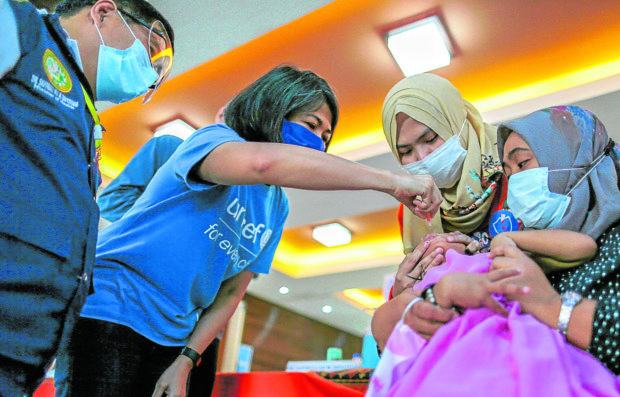
PROTECTING KIDS A doctor from the United Nations International Children’s Fund (Unicef) gives a dose of oral polio vaccine to a child during the launch of this year’s synchronized polio vaccination program in Cotabato City. Polio, which had been eradicated in the Philippines in 2000, reemerged last year with a case in Lanao del Sur. —CONTRIBUTED PHOTO
COTABATO CITY—Amid the massive vaccination program following the reemergence of polio in the country last year, the United Nations International Children’s Fund (Unicef) reported fresh cases of polio-like symptoms among children in the Bangsamoro Autonomous Region in Muslim Mindanao (BARMM).
Speaking at the launch of Unicef’s antipolio drive here on Monday, Andrew Morris, Unicef Philippines chief of mission in Mindanao, said there had been new cases of polio among children across the region.
“It means that the virus has been tackled, but not yet eliminated with certainty,” Morris said.“All children have to be reached with polio drops again. We have no choice. If we don’t reach all children, there will be more and more polio cases in the future,” he added, noting that doing so would be a greater challenge due to the current new coronavirus disease (COVID-19) pandemic.
Latest data gathered by the World Health Organization (WHO) and Unicef showed that the BARMM had recorded nine cases of polio.
Priority
This year’s nationwide immunization program, which started on July 20 until Aug. 2, will cover more than 3.1 million children below 5 years old and 900,000 children between 5 and 10 years old in the BARMM.
“We assure them (parents) that the protocols are followed and their children will be vaccinated with no risk,” Morris said.Dr. Rabindra Abeyasinghe, the WHO representative in the Philippines, expressed his commitment and support for the campaign.“Polio remains a key priority area of WHO,” Abeyasinghe said. “We are fully committed to control this outbreak in the Philippines. We urge our partners especially the ministries to go together and respond to the outbreak.”
Polio — which has no cure and can only be prevented with vaccines — is a fatal and disabling disease caused by poliovirus and can result in irreversible paralysis affecting most commonly the leg muscles, but for 5 percent to 10 percent of acute flaccid paralysis cases, the breathing muscles are also affected which can cause death.
Its symptoms include fever, fatigue, headache, vomiting, stiff neck and sudden onset of floppy arms or legs.
It is a highly infectious disease that mainly affects young children and can be transmitted primarily through the fecal to oral route resulting from poor sanitation and hygiene practices, and less frequently through contaminated food or water.
Participation
BARMM Chief Minister Ahod Ebrahim, who attended the kickoff of the “Sabayang Patak Kontra Polio” here, urged parents to participate and allow their children to be vaccinated under the program.
“This is not new and not against our Islamic teachings. It’s clear to us [how] important [are the] vaccines. I am knocking at the doors of our parents. So please, let’s participate,” he said.
Ebrahim said that even before the COVID-19 pandemic, the BARMM began the vaccination of children below 5 years old in the region.
The reemergence of polio in the Philippines was announced in September 2019, 19 years since it was eradicated in the country.
—With a report from Inquirer Research